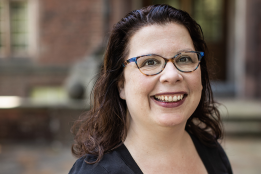Navigating the path to an environmental career

Mount Holyoke College students interested in environmentally based careers were able to talk to alums and explore fieldwork.
In late November, Mount Holyoke students interested in pursuing opportunities in environmental fields got the chance to gather in person and virtually to learn firsthand experiences of how fellow alums have carved their own career paths through the Exploring Future Possibilities in Environmental Careers event held by the Miller Worley Center for the Environment.
“It’s really a way for students to understand the options that are available to them when it comes to environmental careers,” Angelica Patterson, curator of education and outreach of the Miller Worley Center, said. “They get exposed to learning about different careers through our alum panel.”
The event, held on November 28 and 29, began with an online panel hosted by Adrienne Baxter, the assistant sustainability program manager. The hour-and-a-half-long Zoom event consisted of alums sharing stories about their career path trajectories and descriptions of their current roles. The panel included Kanchi Gashaw ’15, energy engineer, renewables and sustainability; Whitney Fraser ’98, environmental consultant; Ame Trandem ’00, program manager — Europe at the Plastic Solutions Fund; Tarana Bhatia ’15, corporate responsibility, strategy and program management; and Katie Blake ’15, conservationist at Highstead.
The next day was an in-person Field Skills Workshop led by Patterson. Students learned what to expect when venturing into the field to conduct research to help them better understand the conditions and dangers that can come while traversing in unfamiliar or remote locations. Patterson discussed the safety guidelines that field researchers should know, risks that come with being in certain environments and what they can do to help minimize those risks and have a productive and safe field experience. She also shared with students the benefits of getting experience in the field, which can include career readiness, transferable skills and having novel experiences in places you may not have ever been or explored.
“I wanted to communicate what skills are highly regarded in the field of environmental science so they are prepared when they’re going out to remote locations or even urban locations,” Patterson said. “I also go over some things that they need to be aware of and be prepared to handle.”
Following Patterson’s workshop was “From the Classroom to the Canopy: The Wandering Path of An Adventuring Scientist,” featuring keynote speaker and alum Sybil Gotsch ’97. Gotsch earned her bachelor’s degree in biology at Mount Holyoke. In the four years after graduation, she worked with an environmental nonprofit and as a research assistant in Panama and Costa Rica. While completing her two postdoctoral degrees, she was stationed in Brazil and Mexico.
Currently, Gotsch is a professor and runs a research lab at the University of Kentucky, where she studies water relations of plant communities and how climate change will impact plant community structure and ecosystem function.
“I advise a lot of students as part of my job, and I feel like students nowadays are much more driven to have an immediate answer as to their path,” Gotsch said. “I think, in many ways, my path has been atypical. I’ve wandered a lot, and I value all of those experiences that may have been somewhat tangential to what my current job is. So my path has been a wandering path, but it’s been a fruitful one in terms of growth, learning and experience.”
The invite also allowed her to reflect on the importance of the Mount Holyoke community. Although events such as this didn’t exist when she attended the College, the MHC community has served to be an important resource for her throughout her career.
“Mount Holyoke was a huge part of my growth as an adult. Many of the people that I rely on today during the hardest of times are my friends from Mount Holyoke. The longevity of these relationships is so meaningful because we truly know one another. We can support each other and at the same time challenge one another when we are falling short of our potential. These relationships for me are gold,” she said.
Whether learning what it is like to scale a tree in humid 90 degree heat, collecting samples in frigid temperatures, learning to function in environments swarming with bugs or working with legislature, the Exploring Future Possibilities in Environmental Careers event allowed students to glean insight on what kind of work they could envision themselves doing while offering the idea that there is no straight path to establishing or achieving career goals.
“Nontraditional paths may or may not quite align with what you were trained for, but you can always circle back,” Patterson said. “It’s good to have a plan, but don’t necessarily bank on that plan because life is full of surprises, and you never know where it can lead you.”
